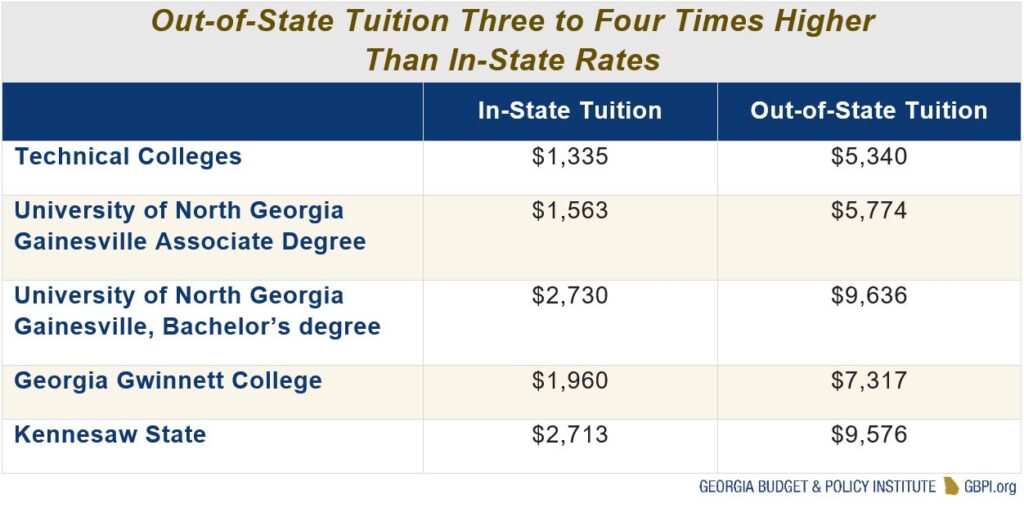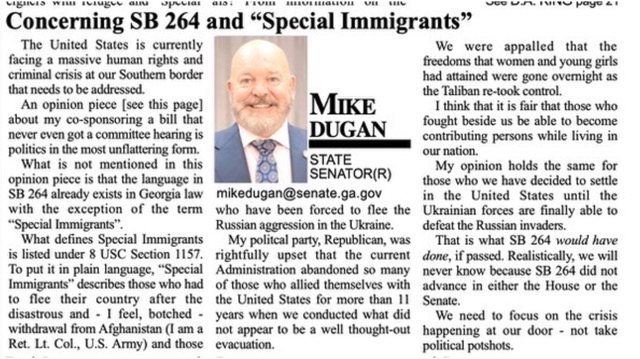
Last week Insider Advantage posted my column on the pending instate tuition bill, SB 264 and its Republican cosponsors. A version of the column was later published in the June 11, 2023 edition of the (Carroll County) Star News (there is another version here. Also a post on the bill with more information here). The Star News editor also published a reply from SB 264 cosponsor Sen. Mike Dugan below my column in which he makes some astoundingly inaccurate claims in defense of his support for the legislation. As there is not yet a dedicated link to Senator Dugan’s Star News response, I post a screen shot of his reply below.

My fact-check reply to Sen Dugan’s response:
- Senator Dugan writes that “the bill never even got a committee hearing.”
The reality is that the Senate Higher Education Committee held a hearing on the bill on March 16, 2023. I watched it. The link to archived video, transcript, and a photo from that meeting is here.
- Senator Dugan: “…the language in SB 264 already exists in Georgia law with the exception of the term “Special Immigrants.”
We ask that Sen. Dugan cite that language in Georgia law.
Senate Bill 264 amends state law to read that “…refugees, special immigrants and humanitarian parolees shall be classified as in-state for tuition purposes immediately upon settlement in Georgia;” This would remove the existing 12 month residency requirement for that group of foreign nationals. It would not do the same for Americans. Please see lines 17 – 23. This language is not in existing state law.
We advise all concerned to read the explanation of the bill from its originators when it was numbered HB 932 in 2022. That attempt failed when the House Higher Education Committee chairman declined to advance the bill.
Sen Dugan is correct that the measure would add the term “special immigrants” (known as “SIVs”) to the code, but SIVs already have Lawful Permanent Residence status. And OCGA 20-3-66 (3) (e) – (and Board of Regents policy 4.3.2.3) – already grants individuals with LPR status “the same consideration as citizens of the United States in determining whether they qualify for in-state classification.”
- Senator Dugan in his reply column: “What defines Special Immigrants is listed under 8 USC 1157.”
Reality: 8 U.S. Code § 1157 deals with refugees as is made clear in the law’s caption: “Annual admission of refugees and admission of emergency situation refugees.” Refugees are not SIVs. “Refugee” is defined in multiple links throughout the federal law as posted here.
SIVs are defined and created in federal laws cited in the language of the bill (lines 18-22).
More on special immigrants (SIVs) here
- Sen Dugan writes that that the term “Special Immigrants” includes “…those who were forced to flee the Russian aggression in the Ukraine.”
Actually, some Ukrainians are allowed to enter the U.S. under Humanitarian Parole status (a good explanation here) and some have received Temporary Protected Status (TPS). TPS is not SIV. Neither is Humanitarian Parole.
- Senator Dugan: “I think that it is fair that those who fought beside us be able to become contributing persons while living in our nation.”
Fine. Very noble. But the Democrat legislation Sen Dugan has put his name on and is pushing creates a benefit and significant monetary savings for foreign nationals that is not available to Americans in their own country. And he is wildly inaccurate in his defense of that decision.
Related: Refugee Resettlement Fraud in the Program for U.S.-Affiliated Iraqis – A repeat scenario with Afghan nationals?
- On SB 264 Sen Dugan writes: “This is what SB 264 would have done if passed. Realistically we will never know because SB 264 did not advance in the House or the Senate.”
This is another head-shaker. It is difficult to understand this statement. SB 264 was dropped in the Senate hopper on February 27, 2023. While it had a hearing (without a vote) after Crossover Day, it can still easily advance. Because the Georgia General Assembly operates on a biennial system, legislation that didn’t pass will be carried over to the second half of the biennial General Assembly starting January 8 2024. Realistically the legislation is quite viable for the 2024 session.
________
Notes.
From information on the University of West Georgia website we see that the instate tuition rate at UWG is $2186.00 (12 credit hours) vs the out-of-state cost of $7712.00 per semester.
Section 20-3-66 – Determination of in-state resident status of students for tuition or fees
(b)(1)
“An independent student who has established and maintained a domicile in the State of Georgia for a period of at least 12 consecutive months immediately preceding the first day of classes for the term shall be classified as in-state for tuition purposes.”
A quick look at the Board of Regents webpage on instate tuition eligibility illustrates the same truth: ”…lawful permanent residents, refugees, asylees, or other eligible noncitizens may be extended the same consideration as citizens of the United States in determining whether they qualify for in-state classification.” Because they have LPR status, this already includes SIV recipients.

